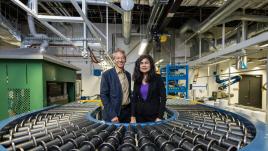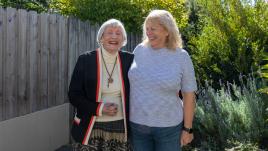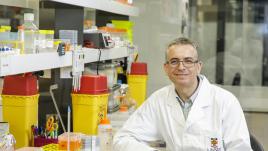No-one left behind
The COVID-19 Student Emergency Response Fund provided financial aid to students in need. It also left them feeling safe, supported and hopeful.
Within weeks of the start of the 2020 student year, the announcement of the COVID-19 pandemic triggered sweeping changes across the community. Universities, and their student communities, were caught up in the chaos.
“The novel coronavirus precipitated an unprecedented crisis in the tertiary education sector,” says UNSW Chancellor David Gonski AC. “Our students, who often manage a degree of uncertainty, had to navigate changes in virtually every area of their lives. In addition to moving to online learning and coping with the isolation that this can bring, many lost their source of income and, with it, their ability to pay for basic necessities.”
The impact was especially great on students from regional areas, and those from interstate and overseas who suddenly found themselves cut off from families and support networks.
Deeply moved by the scale of the crisis facing the student community, Chancellor David Gonski and President & Vice-Chancellor Professor Ian Jacobs personally donated funds to establish the COVID-19 Student Emergency Response Fund, administered by the UNSW Division of Equity Diversity & Inclusion (EDI). Word went out to alumni, staff and friends of the University, and the appeal gained momentum. By the close of Term 1, the UNSW community had rallied to support vulnerable students through the provision of supermarket e-vouchers for all at-risk students, emergency support payments of $500 for students from low socioeconomic backgrounds, and emergency grants of up to $2,000 for students with complex needs, including disabilities, housing issues or carer responsibilities.
“It was incredibly heartening to see the response of our alumni, friends and members of staff,” says Professor Eileen Baldry, Deputy Vice-Chancellor, EDI. “In addition to having a positive impact on their financial situation, many students reported that the support they received made a difference to their general sense of wellbeing, belonging and hope for a positive future.”
Simone, a mature-aged Art & Design student from Mudgee, was one of thousands supported by the fund. At the start of the pandemic, Simone lost her part-time job and was ineligible for government assistance.
“The support I received not only helped me financially, but also emotionally and mentally,” Simone says. “It was really an empowering feeling to receive support like that.”
|
A research-led recovery
Art & Design student Simone says she wouldn’t have been able to complete her final semester without the support she received. Despite the financial challenges of the pandemic, UNSW moved quickly to establish the UNSW COVID-19 Rapid Response Research Fund as a matter of national priority. Crucially, the University recognised that it could contribute not only through research into diagnostic tests and clinical treatments, but also in supportive fields such as research infrastructure, disinfection systems, and manufacturing technology.
One of the projects funded was led by Dr Xiaopeng Li, Senior Lecturer in the School of Mechanical and Manufacturing Engineering. He and his team focused their efforts on the development of a new on-demand manufacturing network for the rapid local manufacture of much needed medical devices and personal protective equipment (PPE).
“For the past year, our focus has been on PPE, however the application of the management system we have developed can be wide ranging and far reaching,” he says. “We are working with local companies and industrial partners to boost the supply of better PPE, while continuing our research to develop new design and manufacturing techniques for products such as antiviral and replaceable filters.”
In total, 13 projects were selected from among the 167 submissions received. With the support of the UNSW Division of Research & Enterprise and Division of External Engagement, 12 of those projects progressed and are now contributing to Australia’s capacity to respond to this, and future pandemics.

Dr Xiaopeng Li and his team worked with industry to improve manufacturing process for the supply of personal protective equipment.
Images: Susie Phe and Richard Freeman
Words: Julia Richardson







